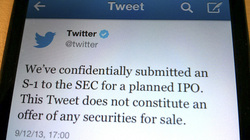
On September 12, Twitter informed the world (through a tweet, naturally) that it is beginning the process of filing for an initial public offering. What made this announcement different is that Twitter took advantage of a provision in the newly-enacted JOBS Act to file its initial paperwork confidentially with the SEC. The JOBS Act allows what it defines as “emerging growth companies” to take advantage of reduced regulation during and after an IPO. Congress defined an emerging growth company as one with less than $1 billion in revenue.
Companies that don't meet the emerging growth criteria must release their IPO filings, usually with pages of detail about their financial condition, risk factors and ownership and management structure, months before they sell their shares. This gives investors, financial analysts and journalists a lot longer to analyze the company's prospects.
Twitter and other emerging growth companies can delay the release until 21 days before a roadshow to investors. The roadshow precedes the offering of shares by a few weeks. The JOBS Act was intended to help startups test the regulatory process for an IPO without worrying about bad publicity if they decide to withdraw their offering.
Companies that don't meet the emerging growth criteria must release their IPO filings, usually with pages of detail about their financial condition, risk factors and ownership and management structure, months before they sell their shares. This gives investors, financial analysts and journalists a lot longer to analyze the company's prospects.
Twitter and other emerging growth companies can delay the release until 21 days before a roadshow to investors. The roadshow precedes the offering of shares by a few weeks. The JOBS Act was intended to help startups test the regulatory process for an IPO without worrying about bad publicity if they decide to withdraw their offering.
